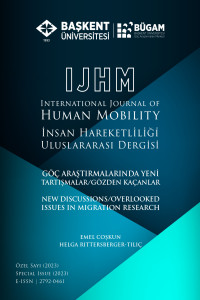Öz
Historically an immigration county, Türkiye has become not only a migrant receiving country but also a part of international migration management, discourse and policies in the last decades. It is possible to observe from published official figures2 that there are more than four million people under Türkiye’s asylum regime, as well as more than one million migrants with residence and work permits, and perhaps even more migrants who live/are forced to live undocumented. In recent years, the rapidly growing number of different migrant groups has become visible in political debates, in the public sphere, in social policy and, obviously, in academia. We observe with concern that these debates encourage hateful discourse against migrants, especially in the election climate and in the aftermath of growing economic problems.
Anahtar Kelimeler
Öz
Historically an immigration county, Türkiye has become not only a migrant receiving country but also a part of international migration management, discourse and policies in the last decades. It is possible to observe from published official figures2 that there are more than four million people under Türkiye’s asylum regime, as well as more than one million migrants with residence and work permits, and perhaps even more migrants who live/are forced to live undocumented. In recent years, the rapidly growing number of different migrant groups has become visible in political debates, in the public sphere, in social policy and, obviously, in academia. We observe with concern that these debates encourage hateful discourse against migrants, especially in the election climate and in the aftermath of growing economic problems.
Anahtar Kelimeler
Ayrıntılar
| Birincil Dil | İngilizce |
|---|---|
| Konular | Göç Sosyolojisi |
| Bölüm | Editoryal |
| Yazarlar | |
| Yayımlanma Tarihi | 10 Ağustos 2023 |
| Yayımlandığı Sayı | Yıl 2023 Sayı: Özel Sayı |


